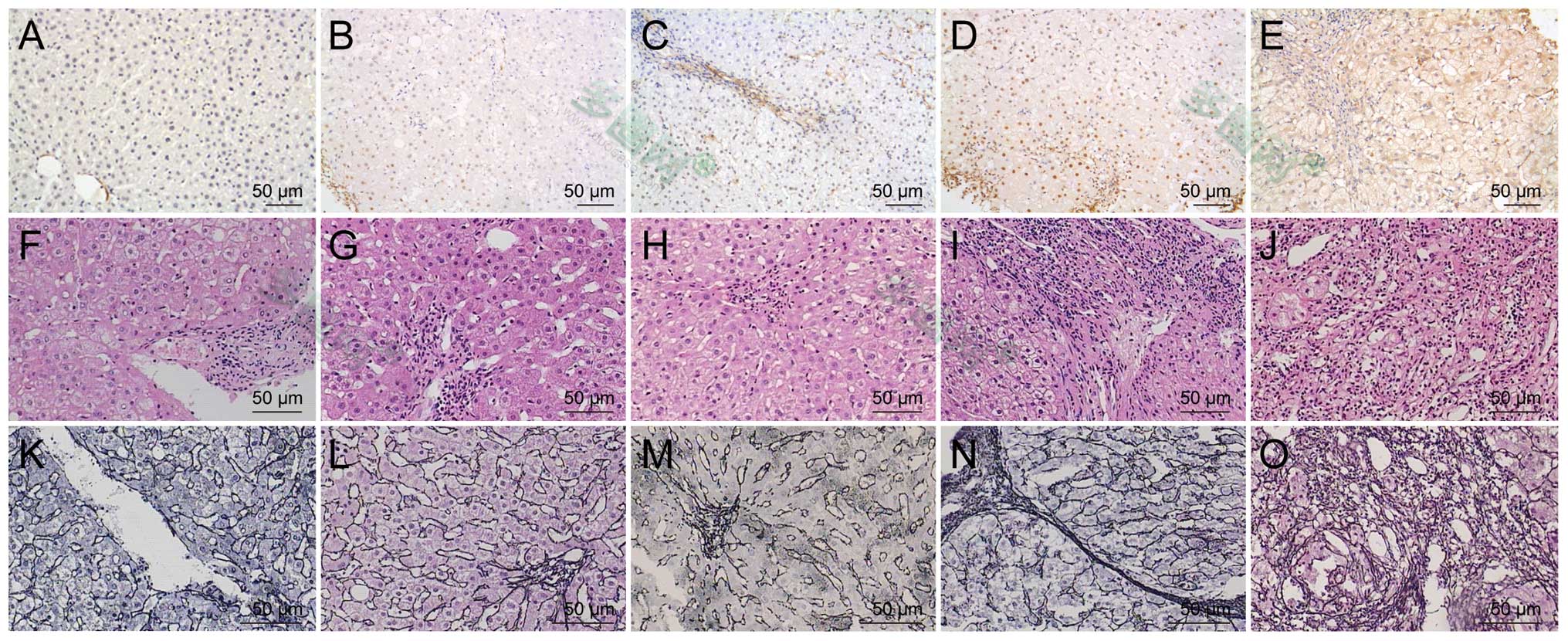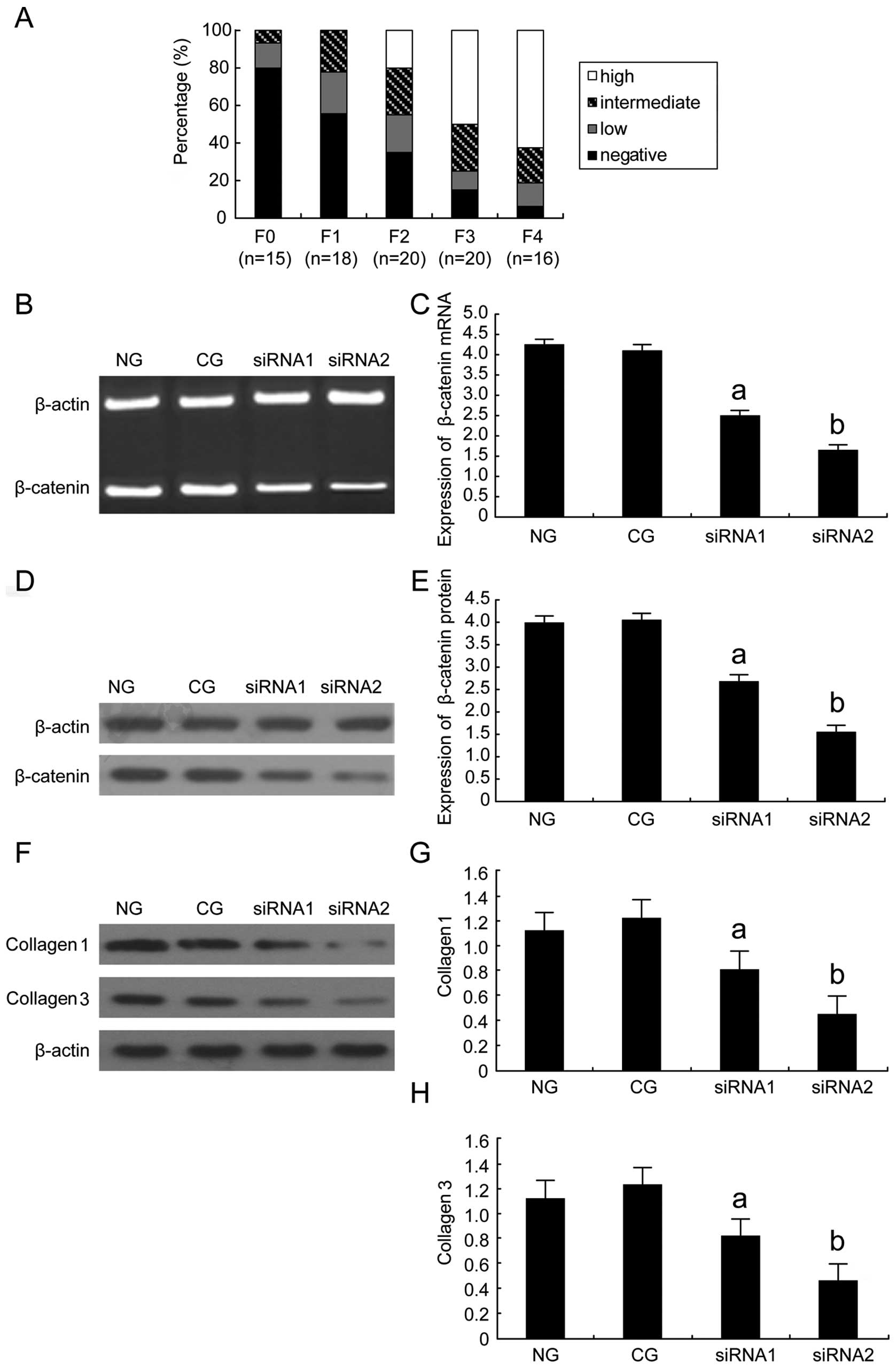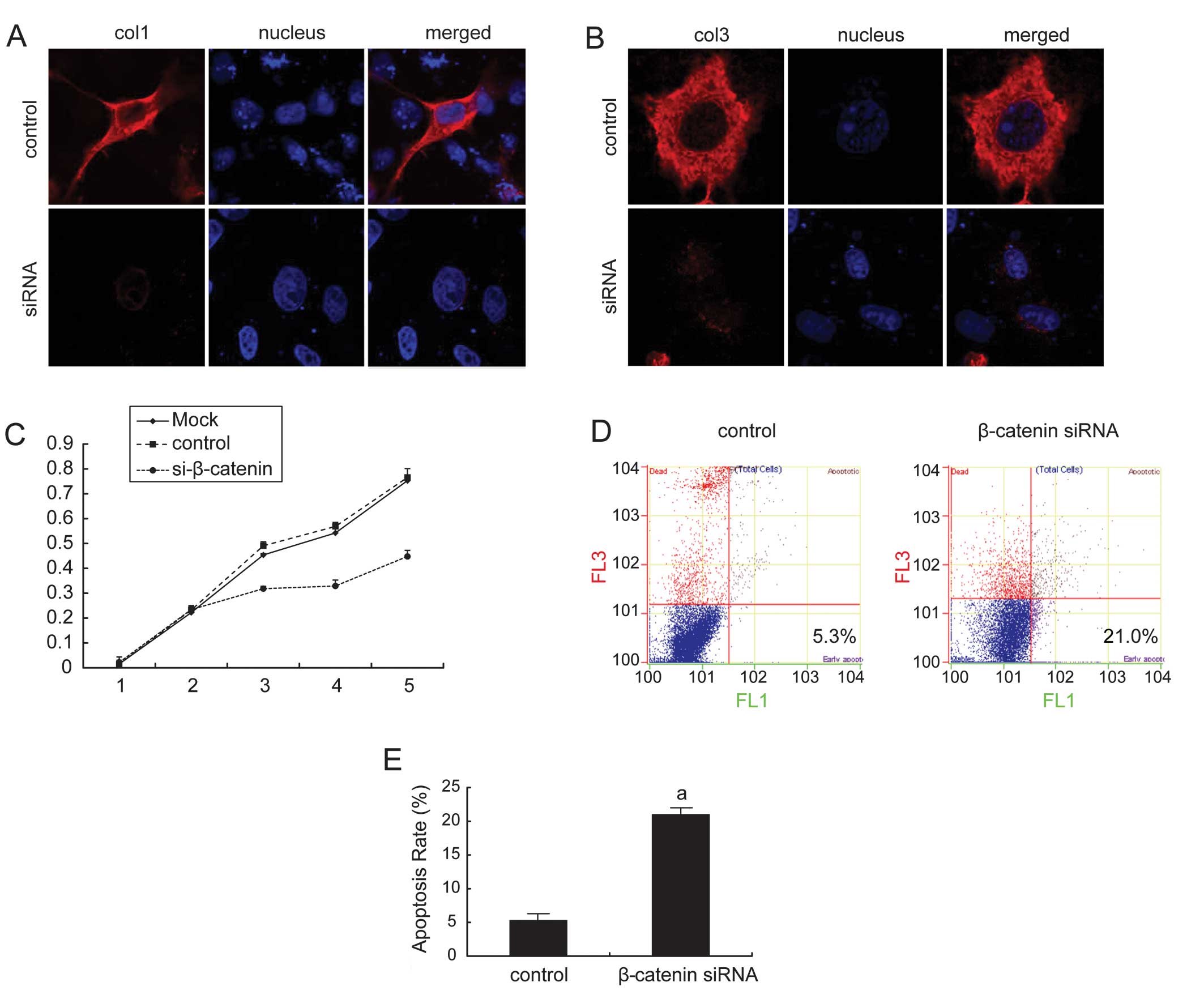|
1
|
Moreira RK: Hepatic stellate cells and
liver fibrosis. Arch Pathol Lab Med. 131:1728–1734. 2007.PubMed/NCBI
|
|
2
|
Gäbele E, Brenner DA and Rippe RA: Liver
fibrosis: signals leading to the amplification of the fibrogenic
hepatic stellate cell. Front Biosci. 8:d69–d77. 2003.PubMed/NCBI
|
|
3
|
Friedman SL: Molecular regulation of
hepatic fibrosis, an integrated cellular response to tissue injury.
J Biol Chem. 275:2247–2250. 2000. View Article : Google Scholar : PubMed/NCBI
|
|
4
|
Morrisey EE: Wnt signaling and pulmonary
fibrosis. Am J Pathol. 162:1393–1397. 2003. View Article : Google Scholar : PubMed/NCBI
|
|
5
|
Moon RT, Kohn AD, De Ferrari GV and Kaykas
A: WNT and beta-catenin signalling: diseases and therapies. Nat Rev
Genet. 5:691–701. 2004. View
Article : Google Scholar : PubMed/NCBI
|
|
6
|
Jiang F, Parsons CJ and Stefanovic B: Gene
expression profile of quiescent and activated rat hepatic stellate
cells implicates Wnt signaling pathway in activation. J Hepatol.
45:401–409. 2006. View Article : Google Scholar : PubMed/NCBI
|
|
7
|
Jiao J, Friedman SL and Aloman C: Hepatic
fibrosis. Curr Opin Gastroenterol. 25:223–229. 2009. View Article : Google Scholar
|
|
8
|
Nejak-Bowen K and Monga SP:
Wnt/beta-catenin signaling in hepatic organogenesis. Organogenesis.
4:92–99. 2008. View Article : Google Scholar : PubMed/NCBI
|
|
9
|
Chen SW, Chen YX, Zhang XR, et al:
Targeted inhibition of platelet-derived growth factor receptor-beta
subunit in hepatic stellate cells ameliorates hepatic fibrosis in
rats. Gene Ther. 15:1424–1435. 2008. View Article : Google Scholar : PubMed/NCBI
|
|
10
|
Scheuer PJ: The nomenclature of chronic
hepatitis: time for a change. J Hepatol. 22:112–114. 1995.
View Article : Google Scholar : PubMed/NCBI
|
|
11
|
Scheuer PJ: Classification of chronic
viral hepatitis: a need for reassessment. J Hepatol. 13:372–374.
1991. View Article : Google Scholar : PubMed/NCBI
|
|
12
|
Vogel S, Piantedosi R, Frank J, et al: An
immortalized rat liver stellate cell line (HSC-T6): a new cell
model for the study of retinoid metabolism in vitro. J Lipid Res.
41:882–893. 2000.PubMed/NCBI
|
|
13
|
Elbashir SM, Harborth J, Weber K and
Tuschl T: Analysis of gene function in somatic mammalian cells
using small interfering RNAs. Methods. 26:199–213. 2002. View Article : Google Scholar : PubMed/NCBI
|
|
14
|
Friedman SL: Hepatic fibrosis - overview.
Toxicology. 254:120–129. 2008. View Article : Google Scholar
|
|
15
|
Connolly MK, Bedrosian AS, Mallen-St Clair
J, et al: In liver fibrosis, dendritic cells govern hepatic
inflammation in mice via TNF-alpha. J Clin Invest. 119:3213–3225.
2009.PubMed/NCBI
|
|
16
|
Friedman SL: Mechanisms of hepatic
fibrogenesis. Gastroenterology. 134:1655–1669. 2008. View Article : Google Scholar : PubMed/NCBI
|
|
17
|
MacDonald BT, Tamai K and He X:
Wnt/beta-catenin signaling: components, mechanisms, and diseases.
Dev Cell. 17:9–26. 2009. View Article : Google Scholar : PubMed/NCBI
|
|
18
|
Habas R and Dawid IB: Dishevelled and Wnt
signaling: is the nucleus the final frontier? J Biol. 4:22005.
View Article : Google Scholar : PubMed/NCBI
|
|
19
|
Gordon MD and Nusse R: Wnt signaling:
multiple pathways, multiple receptors, and multiple transcription
factors. J Biol Chem. 281:22429–22433. 2006. View Article : Google Scholar : PubMed/NCBI
|
|
20
|
He X, Semenov M, Tamai K and Zeng X: LDL
receptor-related proteins 5 and 6 in Wnt/beta-catenin signaling:
arrows point the way. Development. 131:1663–1677. 2004. View Article : Google Scholar : PubMed/NCBI
|
|
21
|
Logan CY and Nusse R: The Wnt signaling
pathway in development and disease. Annu Rev Cell Dev Biol.
20:781–810. 2004. View Article : Google Scholar : PubMed/NCBI
|
|
22
|
Young CS, Kitamura M, Hardy S and
Kitajewski J: Wnt-1 induces growth, cytosolic beta-catenin, and
Tcf/Lef transcriptional activation in Rat-1 fibroblasts. Mol Cell
Biol. 18:2474–2485. 1998.PubMed/NCBI
|
|
23
|
Schmidt-Ott KM and Barasch J:
WNT/beta-catenin signaling in nephron progenitors and their
epithelial progeny. Kidney Int. 74:1004–1008. 2008. View Article : Google Scholar : PubMed/NCBI
|
|
24
|
Surendran K, McCaul SP and Simon TC: A
role for Wnt-4 in renal fibrosis. Am J Physiol Renal Physiol.
282:F431–F441. 2002.PubMed/NCBI
|
|
25
|
Shackel NA, McGuinness PH, Abbott CA,
Gorrell MD and McCaughan GW: Identification of novel molecules and
pathogenic pathways in primary biliary cirrhosis: cDNA array
analysis of intrahepatic differential gene expression. Gut.
49:565–576. 2001. View Article : Google Scholar : PubMed/NCBI
|
|
26
|
Nhieu JT, Renard CA, Wei Y, Cherqui D,
Zafrani ES and Buendia MA: Nuclear accumulation of mutated
beta-catenin in hepatocellular carcinoma is associated with
increased cell proliferation. Am J Pathol. 155:703–710. 1999.
View Article : Google Scholar : PubMed/NCBI
|
|
27
|
Monga SP, Pediaditakis P, Mule K, Stolz DB
and Michalopoulos GK: Changes in WNT/beta-catenin pathway during
regulated growth in rat liver regeneration. Hepatology.
33:1098–1109. 2001. View Article : Google Scholar : PubMed/NCBI
|
|
28
|
Sodhi D, Micsenyi A, Bowen WC, et al:
Morpholino oligonucleotide-triggered beta-catenin knockdown
compromises normal liver regeneration. J Hepatol. 43:132–141. 2005.
View Article : Google Scholar : PubMed/NCBI
|
|
29
|
Cadoret A, Ovejero C, Terris B, et al: New
targets of beta-catenin signaling in the liver are involved in the
glutamine metabolism. Oncogene. 21:8293–8301. 2002. View Article : Google Scholar : PubMed/NCBI
|
|
30
|
Si-Tayeb K, Lemaigre FP and Duncan SA:
Organogenesis and development of the liver. Dev Cell. 18:175–189.
2010. View Article : Google Scholar
|
|
31
|
Nejak-Bowen KN, Thompson MD, Singh S, et
al: Accelerated liver regeneration and hepatocarcinogenesis in mice
overexpressing serine-45 mutant beta-catenin. Hepatology.
51:1603–1613. 2010. View Article : Google Scholar : PubMed/NCBI
|
|
32
|
Audard V, Grimber G, Elie C, et al:
Cholestasis is a marker for hepatocellular carcinomas displaying
beta-catenin mutations. J Pathol. 212:345–352. 2007. View Article : Google Scholar : PubMed/NCBI
|
|
33
|
Kim M, Lee HC, Tsedensodnom O, et al:
Functional interaction between Wnt3 and Frizzled-7 leads to
activation of the Wnt/beta-catenin signaling pathway in
hepatocellular carcinoma cells. J Hepatol. 48:780–791. 2008.
View Article : Google Scholar : PubMed/NCBI
|
|
34
|
Cheng JH, She H, Han YP, et al: Wnt
antagonism inhibits hepatic stellate cell activation and liver
fibrosis. Am J Physiol Gastrointest Liver Physiol. 294:G39–G49.
2008. View Article : Google Scholar : PubMed/NCBI
|
|
35
|
He W, Dai C, Li Y, et al: Wnt/beta-catenin
signaling promotes renal interstitial fibrosis. J Am Soc Nephrol.
20:765–776. 2009. View Article : Google Scholar : PubMed/NCBI
|
|
36
|
Kim TH, Kim SH, Seo JY, et al: Blockade of
Wnt/β-catenin pathway attenuates bleomycin-induced pulmonary
fibrosis. Tohoku J Exp Med. 223:45–54. 2011.
|

















